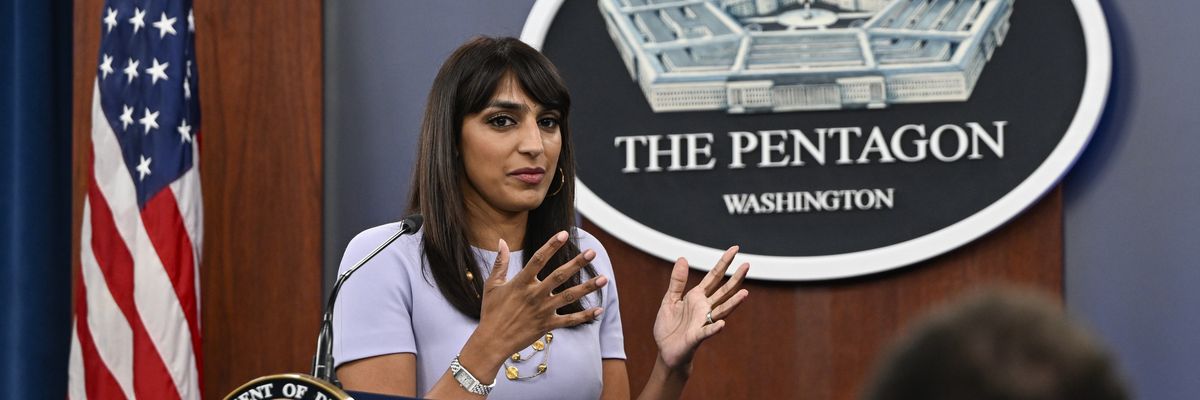Biden administration officials on Monday conceded they have no evidence indicating that Iran ordered the drone attack that killed three U.S. servicemembers near Jordan's border with Syria over the weekend—an admission that hasn't stopped warhawks in Congress from demanding direct retaliation against Tehran.
The Islamic Resistance in Iraq, a coalition of militia groups, claimed responsibility for Sunday's attack, saying in a statement that "if the U.S. keeps supporting Israel, there will be escalations."
"All the U.S. interests in the region are legitimate targets, and we don't care about U.S. threats to respond," a coalition official said.
In their statements shortly following the deadly drone attack, administration officials—including U.S. President Joe Biden—blamed "Iran-backed militant groups" for the deaths of the three American soldiers and pledged to retaliate, while acknowledging they did not yet have all of the facts.
Sabrina Singh, the Pentagon's deputy press secretary, said during a media briefing on Monday that "we know that Iran funds these groups" but said the U.S. does not have any specific evidence that Iran was behind Sunday's attack.
"We're doing an intelligence assessment," said Singh. "We just know that Iran funds these groups."
U.S. officials have also anonymously told prominent newspapers, including The New York Times and The Wall Street Journal, that there's no proof Iran directed the attack.
"It is not yet clear who, exactly, Mr. Biden aims to deter," the Times reported Monday. "American intelligence officials say that while Iran provides weapons, funding, and sometimes intelligence to its proxy groups, there is no evidence that it calls the shots—meaning it may not have known in advance about the attack in Jordan."
Iran has publicly denied involvement in the attack on U.S. troops in Jordan. Nasser Kanaani, a spokesperson for the Iranian Foreign Ministry, said in a statement Monday that Iraqi militia groups "do not take orders" from Iran and dismissed as "baseless" any claim that Iran directed the first deadly attack on American servicemembers since October 7.
"Repeating the unfounded allegations against Iran," Kanaani added, "is shifting of the blame and a plot by those who see their interests in once again getting the U.S. involved in a new conflict in the region and provoke it to expand and escalate the crisis in order to put a lid on their problems in this way."
Sen. Lindsey Graham (R-S.C.), one of the most fervent anti-Iran hawks in Congress, called Iran's denial of responsibility "BS" and "beyond offensive," and urged the Biden administration to "target Iranian oil" or "military infrastructure valuable to the regime."
Numerous other Republicans, and some Democrats, sent similarly belligerent messages to the president in the wake of Sunday's attack, calling Iran "the head of the snake" and "an existential threat" to the U.S. and its allies in the region.
"We should find smart Iranian targets that are low risk of our aircraft getting shot down and teach Iran a lesson," said Rep. Don Bacon (R-Neb.), a member of the House Armed Services Committee.
"It's time for President Biden to use his leverage to bring about a cease-fire."
The dearth of specific evidence of Iranian involvement does not appear to have dissuaded U.S. officials from preparing for an aggressive response, even amid growing bipartisan criticism that Biden is engaged in acts of war without congressional authorization.
Citing unnamed officials, CNN reported Monday that the administration's response to Sunday's attack is "likely to be more powerful than previous American retaliatory strikes in Iraq and Syria."
During a press conference on Monday, U.S. Secretary of State Antony Blinken said that the administration's response "could be multileveled, come in stages, and be sustained over time."
"We will respond, we will respond strongly, we will respond at a time and place of our choosing," Blinken said shortly after he insisted the U.S. does not "seek war with Iran."
If the administration truly wants to avoid a direct war with Iran and a broader regional conflict, it should be pursuing a cease-fire in the Gaza Strip instead of contributing to the escalating cycle of violence in the Middle East, Mark Weisbrot and Justin Talbot Zorn of the Center for Economic and Policy Research argued in an op-ed for TIME magazine on Monday.
"Whatever the motivations of Iran and allied regional militias, it is clear that they have been launching attacks in response to Gaza," Weisbrot and Zorn wrote. "During the six-day cease-fire between Israel and Hamas in November, attacks by militias on American troops largely stopped."
"It's time for President Biden to use his leverage to bring about a cease-fire," they added. "This could save thousands of lives and prevent an expanded regional war. It could very well save his presidency, too."




